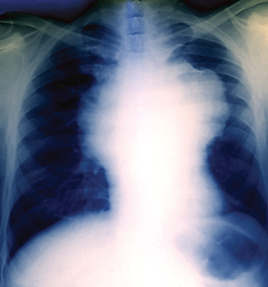Reflections from a physician who faced his mortality
A physician who developed severe heartburn recalls his thinking as he reflects on his own progressively severe symptoms and increasingly worrisome differential diagnosis.
As physicians, we are all privileged to share with our patients the experience of illness, helping to inform and guide. When we as physicians become ill ourselves, we face unique challenges and gain unique insights. This column will explore those dimensions of experience, when doctors become patients.
We recently spoke with Robert S. Brown, MD, FACP, associate professor of medicine at Harvard Medical School and attending nephrologist at Beth Israel Deaconess Medical Center in Boston. Dr. Brown had always been in good health, except for orthopedic injuries due to competitive tennis and squash.

In 2002, he developed severe heartburn, a symptom that he had never had before. As physicians often do, he obtained a “curbside” consult from a colleague who was a gastroenterologist. The physician suggested that he begin treatment with a proton-pump inhibitor, but over the ensuing weeks his symptoms worsened to the point that he had to sit upright at night to sleep.
After three months, Dr. Brown arranged for an upper endoscopy. Several days before the scheduled procedure, he developed back pain. He attributed this to five games of squash the day before. However, over the course of 24 hours, his back pain significantly worsened, he felt feverish and he had pain in his right upper quadrant.
“I thought I had gallbladder disease,” he told us, “although none of the symptoms really fit.” Physicians often run a differential diagnosis about themselves when developing symptoms or signs, and as Dr. Brown observed, “Usually you are not a very good doctor for yourself.”
Dr. Brown went to the emergency department. He had less pain on the way and considered simply going home, “but my wife shooed me into the ER,” he said.
A resident examined him and placed his fingers over Dr. Brown's supraclavicular fossae. He asked, “Did you ever notice this before?” There were several hard, matted lymph nodes in the area.
“I remember thinking, ‘This is a Virchow's node, and I have metastatic gastric cancer,’” Dr. Brown said. “‘How am I going to tell my wife that I am going to die?’”
Shortly after the resident finished the examination, he left the room and returned with an attending radiologist. “I am sorry to tell you that you appear to have lymphoma,” the radiologist said.
Dr. Brown recalled his thoughts at the time. “I wasn't particularly afraid. I thought I would be much more afraid when faced with death, but neither then nor in the future was I particularly afraid. Those four hours did me good while I waited for the CAT scan. It showed me what a poor physician you are for yourself, because you know when we see a patient with lymph node masses, we are always hopeful that maybe it will be lymphoma. I never in a million years dreamed that I had lymphoma. Didn't even come to my mind.”
He recalled looking at the attending radiologist, who had an odd expression. “It was because I looked happy. I remember telling him, ‘This is good, because now I really have a fighting chance. Now I don't have to tell my wife that I'm surely going to die. I'll tell her that I have lymphoma and I've got a pretty reasonable chance of survival, 50-50.’”
A lymph node biopsy showed a large-cell lymphoma, non-Hodgkin's type. Dr. Brown's heartburn was the result of large masses in his spleen compressing the stomach. A bone marrow biopsy did not show any evidence of lymphoma.
The attending oncologist told Dr. Brown that he was in the “high-intermediate risk group” because of disease above and below the diaphragm, as well as a markedly elevated lactate dehydrogenase level. Dr. Brown recalled that when his oncologist explained the point system for categorizing patients in the high-intermediate group, he was given a point for being over 60.
“So how many points am I in the bad group?” Dr. Brown asked.
His oncologist said, “By one point.”
Dr. Brown paused and then said, “Well, wait a minute. You gave me a point for being over 60.”
“Well, you are over 60.”
“I'm 64, but I'm not really over 60. I'm like the under 60 group and I want that point.”
The oncologist replied, “You know there is another point system without age.”
Dr. Brown said, “Yes, redo it and use that system.”
The oncologist did the calculation again and said, “You are still in the high-intermediate group.”
Dr. Brown said he told him, “‘No. I'm not. I'm optimistic.’ But I didn't look up what the survival rates were. I waited until around my third or fourth treatment, when I felt pretty good, to do that.”
Dr. Brown thought of himself as youthful and vigorous, able to play five games of squash on a Sunday. In addition, his view of himself was shaped by the considerable longevity of other family members. His father died at 97, and most of his uncles and aunts died in their 90s. One uncle “died young” with diabetes at the age of 87.
“So, you know, like most physicians, I thought I had immortality,” he said. “I remembered telling my wife when I was 60 that two-thirds of my life was over. I was contemplating that somehow someone had guaranteed me 90 years. What hubris!”
Dr. Brown began treatment with R-CHOP. Although he responded well, after several cycles he still had some residual disease on PET scan. At this point, there were controversial issues to be addressed. How long should he be treated? Should he ultimately undergo autologous stem-cell transplantation?
Dr. Brown told his oncologist, “With this disease, clearly I can't be my own doctor. I'm going to follow everything that you tell me, but my only request is that you be willing to discuss it all openly with me.”
Dr. Brown observed, “He was the perfect doctor for me, because he is very good at that. He always runs late, because he goes through everything that you want to discuss. If you want that kind of dedication in your physician, you have to expect that the patient before you wants it as well.”
Because of the uncertainties around the optimal length of treatment and the indication for bone marrow transplantation, Dr. Brown and his oncologist agreed that a second opinion would be useful. He saw a lymphoma expert at a different institution in Boston. Dr. Brown asked him, “You are not that much younger than I am. What would you do for yourself?” This is a question that patients often ask physicians when there are several treatment options.
The oncologist responded, “I think if it were me I would cross my fingers and pray and hope that if I relapse I could be put back into remission and do a stem-cell transplant then. But that may or may not be possible if the lymphoma comes back.”
After a lengthy discussion, all agreed to extend the standard treatment regimen and to hold off on bone marrow transplantation. “I am kind of a pay-as-you-go person. The decision fit my personality,” Dr. Brown told us.
Not long after this decision, there was a presentation in Boston of ongoing clinical trials of rituximab therapy for non-Hodgkin's lymphoma. Dr. Brown attended the presentation and sat between his two oncologists. After the data were presented, one oncologist said, “I'm not sure that giving more rituximab is of benefit.” The other oncologist said, “You've had mild side effects, you've done well, so I would continue the rituximab.” Two experts looking at the same data and yet, two different opinions.
As physicians, we frequently encounter the gray zone of medicine where there are various treatment choices, each with potential risks and potential benefits, and no one answer that is clearly right for every patient. Dr. Brown listened to both points of view and made the final decision to extend the rituximab treatment. He is now 10 years in remission.
Dr. Brown said that he now has a “surrealistic feeling” about life, that he is in a “blessed group.” The last 10 years of his life have been “great, because it's a reprieve.” He always felt he had good empathy for patients, but now he feels he has tremendous empathy. While he was dealing with his acute illness, he thought, “At the end of this, I'm either going to live or die, but if I live, I'll be better. And my patients will still be on dialysis. I think patients with chronic diseases are the bravest souls.”



